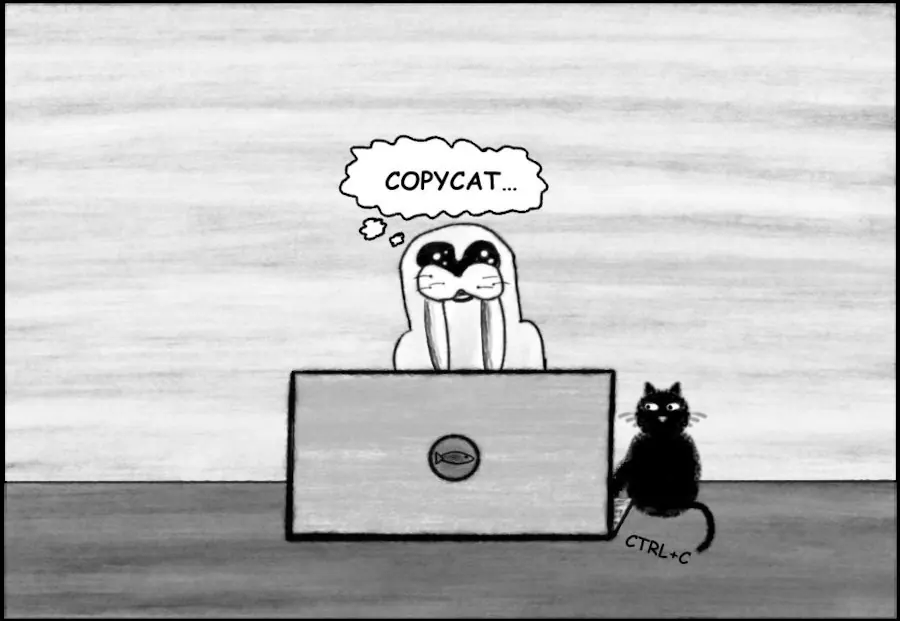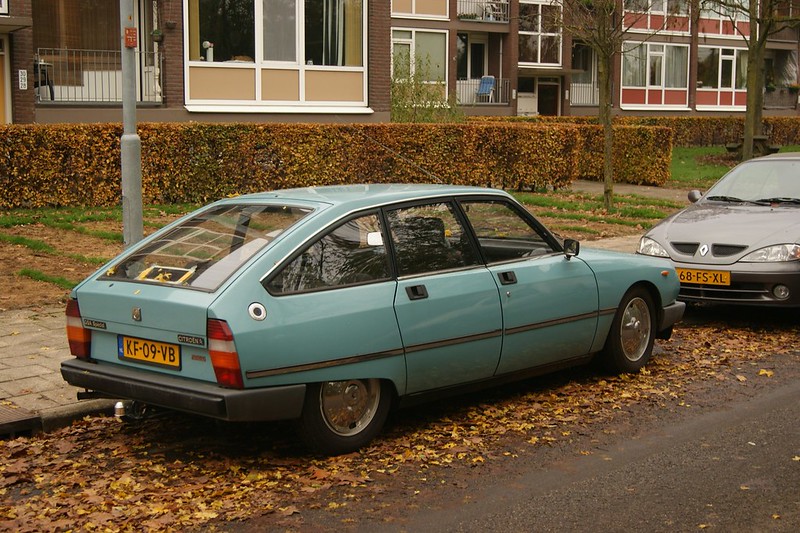November 13, 2023
Individuality and Capitalism: Lessons From Remaking my Website
For a long time I’ve been meaning to revamp Home for Fiction. When I put it together back in 2017, I was in the middle of defending my doctoral dissertation, and I had no time or energy for coding, so I simply picked a ready template. Recently, I finally decided to modify it, and the process was thoroughly revealing. From all things, it also taught me a thing or two about individuality, capitalism, and how society is becoming increasingly more dysfunctional.
Yeah, I know; all this from putting together some web pages?
But, in the end, that’s why we need to be experiencing the world around us before we write: in order to discover the connections that lie there unnoticed.
So, in this post, I’ll briefly explain my motivation in changing some things and, above all, what it taught me about individuality and capitalism. And we’ll begin precisely from this point.

Individuality and Capitalism: Two Strange Bedfellows
For reasons having to do with societal forces (a less conspiratorial-sounding way of saying “how to control public opinion”), capitalism has always been packed together with “being your own person”. The American Dream, freedom"Freedom" must be among the most misunderstood concepts of our time. As I have mentioned before on the blog, Cornelius Castoriades, drawing on Thucydides, has aptly explained how it is not possible to be both free and peaceful, and most people prefer not to be bothered rather than to be free. As Bill Hicks said in one of his stand-ups, assuming the persona of the government, "You are free to do as we tell you! You are free to do as we tell you!", do your thing, being an individual.
All these have been of course historically contrasted with “the other side”, the Soviet Union. Capitalism vs communism, freedom vs totalitarianism, individuality vs “the common good”. But there are some major fallacies involved here, strawman being among the first, binary dilemmas being another.
To put it simply, just because the Soviet Union framework generally obstructed individuality, that doesn’t mean the West, in a capitalist framework, doesn’t. It just does so in less overt, more sophisticated ways. Let’s remember Bertolt Brecht’s timeless words here:
Those who are against Fascism without being against capitalism, who lament over the barbarism that comes out of barbarism, are like people who wish to eat their veal without slaughtering the calf. They are willing to eat the calf, but they dislike the sight of blood. They are easily satisfied if the butcher washes his hands before weighing the meat. They are not against the property relations which engender barbarism; they are only against barbarism itself. They raise their voices against barbarism, and they do so in countries where precisely the same property relations prevail, but where the butchers wash their hands before weighing the meat.
Bertolt Brecht (1935). Writing the truth: Five difficulties. Translation by Richard Winston, for the magazine ‘Twice a Year’. Collected in William Wasserstrom, ed., Civil Liberties and the Arts: Selections from Twice a Year, 1938-48. Syracuse University Press, 1964. Accessed on this page.
It’s the appeal to hypocrisy fallacy, basically. “Just look at how bad the Soviet Union [Cuba/North Korea/etc] was, before you criticize capitalism”. Such statements are missing the point to a sadly entertaining extent.
“You Are Special, Just Like Everybody Else”
Especially when you’re buying stuff! Capitalism needs you to be lumped together with other buyers, because that’s what maximizes profit.
Just go to the supermarket and see. There are 30 “different” bags of chips, only most of them feature the same few flavors. Why? Because companies have taught people what to like and treat them as a homogeneous lump. It maximizes profit.
Consider your mobile phone. Wouldn’t you prefer if it had this, this, and that quality, and lacked this, this, and that? Yeah, me too. But that wouldn’t maximize profit, so instead we need everything to be the same.
We face similar problems with movies and books. Most of my posts regarding genre on Home For Fiction point out the eternal dilemma: Are you an artist or a writer? Do you embrace your “failure” and live for your art, or do you chase marketing stats, ads, people-pleasing?
Citroën: A Warning from Automotive History
If you’re over 40 – and perhaps especially if you live in Europe – you have surely noticed something intriguing: The more time passes, the more cars of various manufacturers look like each other. I mean, if you’re over 40 and familiar with European cars, you remember how a FIAT Panda 80s looked like, how an Autobianchi A112 looked like, and, especially, how a Citroën 2CV looked like.
They all looked very different from one another.
They all had their quirks, their “personality” (certainly in terms of aesthetics), they were recognizable. Citroën, in particular, was behind many ingenious engineering designs in the 70s.
However, to look different is a problem in capitalism. The company (also as a result of strategic decisions and having to abandon the American market) was declared bankrupt and sold to Peugeot. Let’s see the repercussions:
PSA [Peugeot] gradually diluted Citroën’s ambitious, highly individualistic, and distinctive approach to engineering and styling. All through the 1980s, Citroën models became increasingly Peugeot-like […] In this respect PSA followed the worldwide motor industry trend of platform sharing which is a logical way to reduce costs whilst selling apparently different models. By the late 1980s, many of the distinctive features of the brand had been removed or altered. Peugeot’s conventional switchgear replaced Citroën’s quirky but ergonomic Lunule designs, complete with self-cancelling indicators that Citroën had refused to adopt on ergonomic grounds. The cars were “more banal and conventional”, but also able to break into new markets, like fleet vehicles in the UK.
Wikipedia. “Citroën”
Today, a Citroën looks exactly like a Peugeot, which looks exactly like a Toyota, which looks exactly like a Ford, which looks exactly like a Škoda. Yawn…
Here’s another interesting quotation:
[T]oday, basically every company makes cars for basically every country, and they’re not gonna add bitchin’ tail fins to one model just to sell it exclusively in Dubuque, Iowa. Cars are now designed for the broadest possible audience, across the broadest number of countries, to be manufactured in the most efficient possible way. In that way, cars are just like any other mass market product now: phones, movies, rhinoplasty, and such and such. [emphasis mine]
Road And Track
Onward! To mediocrity!

Individuality and Capitalism: Remaking a Website
With Home For Fiction, I don’t try to sell you anything. I hate ads, I hate “monetization”. I’m not perfect (hell, perhaps one could argue I’m not even good), but at least I don’t have any corporate masters.
All this matters because I don’t need to do all sorts of stuff others do to please their audience. I don’t need to show ads, I don’t need to sell subscriptions, and I certainly don’t bombard you with “please subscribe to my newsletter” pop-ups. I also don’t need to kiss your ass responding to asinine feedback – just go to Google Play or the App Store and see all the poor dev(il)s bending over backward.
From the perspective of designing a website, it also means that what works for others doesn’t work for me.
Individuality in capitalism is problematic because most ready solutions are mediocre. That is, they end up being quite literally average because they try to please everyone.
(Re)designing Home for Fiction
The irony is, from your perspective not a lot has changed. The main site should look more or less the same, with some minor differences. What has changed is that it’s now designed exactly as I want it, without all sorts of useless (to me) extras that are meant for selling stuff, tracking visitors, displaying ads, or offering social media buttons.
The differences on the blog are less drastic – I envision the day I’ll find the energy to design my own theme or, better still, set up a headless WordPress solution – but you’ll notice the front page is far slimmer and (a subjective view, to be sure) aesthetically more pleasing. Hell yeah, now the entire blog is revamped! Read how I found the motivation to code it line by line in less than a week.
From a purely technical perspective – I’ll limit the details to this paragraph alone – what I did is that I simply created a bare-bones HTML frame and used JavaScript (with some Ajax calls to a few PHP scripts that fetch images) to populate it with elements dynamically. Even some of the CSS is placed in the “document.ready” block. All this means it’s much faster to load, as it lacks all the needless extras I had no use for.
But would any of this be possible if I didn’t know coding?
Individuality in Capitalism Is Hard
Let’s be honest about it: The problem of mediocrity – the lack of true individuality – in capitalism is also a benefit: The very reason societies exist is to make things accessible. Otherwise, we would need to hunt and cook our own food, make our own clothes, put up our own defense against predators or enemies.
To put it bluntly, how much can we afford to complain about things we couldn’t do ourselves?
It’s a complex issue; just because I can’t design and make my own clothes doesn’t mean I should not demand more ethical products from the manufacturers. Just because I rely on supermarket chains to bring fruits and vegetables from faraway lands doesn’t mean I should blindly accept their less-than-ideal practices.
Yet ultimately, our ability to rebel against such conditions relies on our ability to find alternatives. That is, there comes a time when we draw a line on the sand and (provided we have the backbone to avoid confirmation bias and other cop-outs) we say, Either you fix this or I stop using it.
Stopping leaves us with two branches: Either we learn how to do/find it ourselves, or we simply don’t use it anymore. Redesigning my website was something I could do on my own. For most other things, there is no alternative but give up on them.
I don't show you ads, newsletter pop-ups, or buttons for disgusting social media; everything is offered for free. Wanna help support a human internet?
(If you'd like to see what exactly you're supporting, read my creative manifesto).
